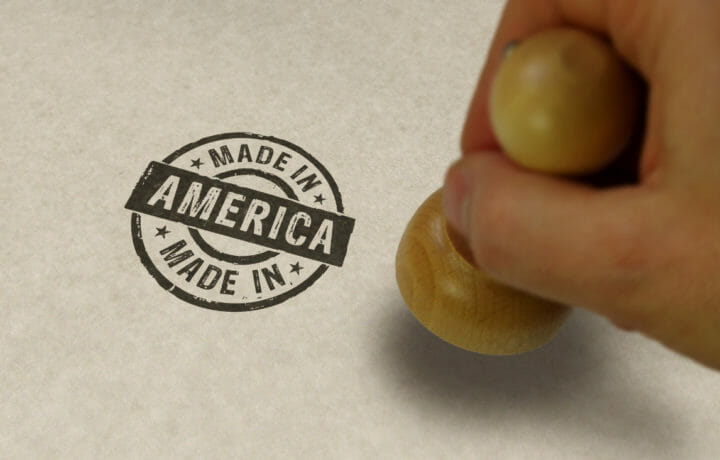“Buy American” isn’t just a slogan that appears on bumper stickers and is touted by political candidates to win over voters. There is an actual law – the Buy American Act (now 41 U.S. Code § 8301-8305) – that was passed by Congress in 1933 and signed by President Herbert Hoover that requires the United States government to prefer U.S.-made products in its purchase.
The Buy American Act (BAA) was enacted to help protect U.S. manufacturing by creating a preference for domestically-made products purchased by the federal government. There are exceptions to the act, however.
Generally speaking, the requirement purchase may be waived by a Contracting Officer or the Head of the Contracting Activity (HCA) if the domestic product is 25% or more expensive than an identical foreign-sourced product, if the product is not available domestically in sufficient quantity or quality, or if doing so is in the public’s interest. Otherwise, the act essentially requires federal agencies to procure domestic materials and products.
Though this law has been on the books for nearly 89 years, few Americans may likely even know about it – but it could get renewed attention as the DOJ announced earlier this week that a Boulder, CO-based company has agreed to pay a $625,000 fine to resolve allegations it had violated the False Claims Act by failing to comply with requirements of the BAA.
Made in China – Not America
The United States alleged that Instec Inc., and its owner/president Zhong Zou, knowingly violated the BAA by falsely certifying that scientific instruments sold to federal agencies and national laboratories were of domestic origin when the goods were actually manufactured in China.
“Those who contract with the government must comply with all applicable terms,” said Principal Deputy Assistant Attorney General Brian M. Boynton, head of the Justice Department’s Civil Division. “This settlement demonstrates the department’s commitment to protect American businesses by enforcing domestic preference requirements.”
The case involved microscopy, spectroscopy, and electrical probing tools with advanced precision thermal controls that were sold to federal agencies and national laboratories, including the Department of Energy, the U.S. Navy, the U.S. Army, and the National Aeronautics and Space Administration.
Claims resolved by the settlement remain allegations only, with no determination of liability.
“When companies commit to manufacture their goods in the United States, then shirk that commitment, they violate the law and undermine American manufacturing jobs, too,” said U.S. Attorney Cole Finegan for the District of Colorado. “The U.S. Attorney’s Office for the District of Colorado is committed to enforcing the Buy American Act and pursuing companies that violate it.”
The False Claims Act
The False Claims Act (FCA), which is also known as the “Lincoln Law,” is actually the federal government’s primary litigation tool in combating fraud against the government. It can impose liability on persons and companies – generally federal contractors – who defraud government programs.
The general spirit of the law existed in statutes that could be found in the colonial law books of several of the original 13 American colonies. However, the origins of the FCA as we know it today, actually date back to the American Civil War, when unscrupulous contractors sold the Union Army unfit horses and mules, as well as faulty rifles and ammunition among other supplies. In response, Congress passed the False Claims Act on March 2, 1863 – and because it was passed under the administration of President Abraham Lincoln as 31 U.S.C. §§ 3729 – 3733, it is often referred to as the Lincoln Law.
In addition to allowing the United States to pursue perpetrators of fraud on its own, the FCA also allows private citizens to file suits on behalf of the government (called “qui tam” suits) against those who have defrauded the government. Private citizens who successfully bring qui tam actions may receive a portion of the government’s recovery. These provisions allow the private party, known as a relator, to file an action on behalf of the United States and receive a portion of any recovery.
Settling the Case
The settlement with Instec and Zou was coordinated by the Justice Department’s Civil Division, Commercial Litigation Branch, Fraud Section, and the U.S. Attorney’s Office for the District of Colorado, with assistance from the Department of Energy Office of Inspector General, the Defense Criminal Investigative Service (DCIS), the National Aeronautics and Space Administration Office of Inspector General, and the Army Criminal Investigation Division.
“Federal contractors cannot simply dispense with contractual requirements designed to protect American industry,” added Department of Energy Inspector General Teri L. Donaldson. “I applaud the investigators as well as the Justice Department and U.S. Attorney’s Office for the District of Colorado for their efforts in reaching this settlement.”
The civil settlement includes the resolution of claims brought by a former Instec employee under the qui tam provisions of the FCA. In this case, the relator will receive $124,500 as part of the settlement.




